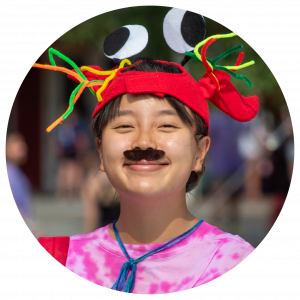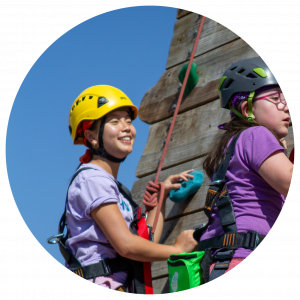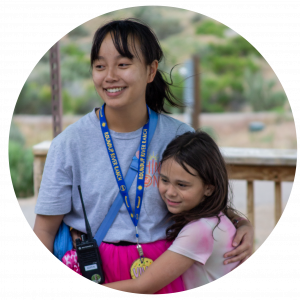Child Life Month: Q&A with Vivi, CCLS
March is Child Life Month, so we are putting the spotlight on Vivi, a past seasonal staff member and volunteer at Roundup River Ranch. Earlier this month, Vivi officially became a Certified Child Life Specialist!
 Q: What is a child life specialist?
Q: What is a child life specialist?
A: child life specialist uses knowledge of child development, stress and coping, and play to support pediatric patients and their families. As a child life specialist at Children’s Hospital Colorado, my job includes:
-
-
-
-
-
-
-
-
-
- explaining procedures, diagnoses, or medical terms to children in language they can understand
- providing support during medical procedures and difficult conversations
- helping kids develop and practice coping strategies to support them throughout their hospitalization
- using play interventions to help kids process their experiences, gain control and normalcy, or have a therapeutic outlet.
-
-
-
-
-
-
-
-
Q: What is your background with camp?
A: I first started at Roundup River Ranch in the summer of 2022 as a camp counselor. That summer, camp counselors were responsible for both programming and cabin life at camp, meaning I got to support my campers across all aspects of being at camp! On the program side of things, I planned activities across all of our program areas for my cabin, including archery, fishing/boating, art, nature, discovery, and more. As part of cabin life, I encouraged socialization and connection for campers in my cabin, assisted campers with gaining independence and practicing life skills, and promoted positive coping with the camp environment. Because I loved camp so much in 2022, I returned in 2024 to Roundup as a cabin leader. This summer, I focused on cabin life and encouraging socialization, independence, and community for my campers. My favorite memories from 2024 include putting on a “camp prom” for the Willow cabin, participating in all camp carnival every week, and playing “banana golf” with the Eagle cabin during Roundup Olympics. I keep coming back to camp because I love how camp truly allows kids to just be kids, regardless of their medical circumstances. Because of our highly trained medical staff, adaptive programming, and inclusive culture, Roundup creates a truly unique space where children of all medical, developmental, or emotional needs are free to play, laugh, and have fun.
Q: How has working at camp influenced your work as a child life specialist?
A: As a child life specialist, I use an approach that is grounded in play to help kids and families cope with an illness, injury, or hospitalization. My work at camp has been a huge influence on the way that I encourage and facilitate play for my patients in the hospital. Because Roundup plans a wide range of activities for campers with varying medical, emotional, and developmental needs, working at camp really expanded my skills and abilities to engage children of diverse needs and goals in therapeutic play. My perspective on adapting play to meet the needs of my patients, as well as my ability to come up with creative play interventions, is incredibly influenced by the experiences I had at Roundup as a camp counselor.
Q: From your perspective as a child life specialist, why is camp so important for campers?
A: Camp is important for our campers for SO many reasons, but as a child life specialist what comes first to my mind is how camp provides peer socialization and normalization opportunities for our campers. From a developmental standpoint, school-age children and adolescents increasingly rely on similarly aged peers for support and connection. When kids of these age groups have life-altering medical diagnoses, it can be an isolating experience due to frequent hospitalizations, having physical or activity restrictions due to their diagnosis, or being perceived as “different” by other kids. Camp supports children experiencing life-altering diagnoses by promoting connections between campers who have had similar experiences. I have heard my campers compare stories of similar surgeries they’ve had, be excited to find out that they take the same medication, and reflect on how hard it was to be the only kid with a chronic illness or disability in their schools. This opportunity for socialization and connection with peers who have similar experiences is incredibly beneficial for our campers and allows them to form therapeutic relationships that support healthy development and positive coping.
Q: From your perspective as a child life specialist, why is camp so important for campers?
A: Camp is important for our campers for SO many reasons, but as a child life specialist what comes first to my mind is how camp provides peer socialization and normalization opportunities for our campers. From a developmental standpoint, school-age children and adolescents increasingly rely on similarly aged peers for support and connection. When kids of these age groups have life-altering medical diagnoses, it can be an isolating experience due to frequent hospitalizations, having physical or activity restrictions due to their diagnosis, or being perceived as “different” by other kids. Camp supports children experiencing life-altering diagnoses by promoting connections between campers who have had similar experiences. I have heard my campers compare stories of similar surgeries they’ve had, be excited to find out that they take the same medication, and reflect on how hard it was to be the only kid with a chronic illness or disability in their schools. This opportunity for socialization and connection with peers who have similar experiences is incredibly beneficial for our campers and allows them to form therapeutic relationships that support healthy development and positive coping.
Q: Please share any other thoughts or impactful experiences you have had related to camp!
A: My absolute favorite part of camp is watching campers, many of whom have spent their whole lives feelings different because of their diagnoses, finally meet and become friends with other kids who help them see that they are not alone in what they have experienced or lived through. In 2022, my cabin was making friendship bracelets when suddenly the topic of hospital cafeteria food came up. My campers then spontaneously began to compare their hospital experiences, what foods they liked from the hospital, and their experiences with various procedures and surgeries. In this time, they were able to reflect on the fact that many of them had similar feelings and experiences regarding the hospital and their diagnoses. For the rest of the week, this cabin was able to continue bonding, both over medical stuff they had in common and also arts and crafts, goofy jokes, and Gaga ball. It is sooooo important for kids facing hard things to know that they are not alone, and Roundup creates a huge positive impact on campers by reminding them of that.
